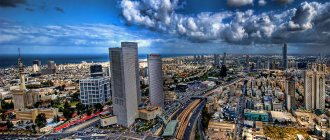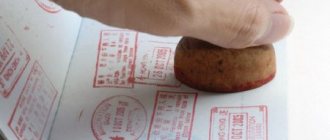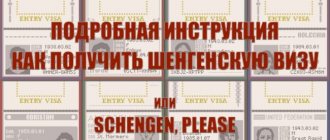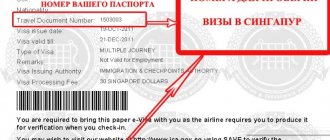Foreign citizens often come to Russia to get higher education, take some training courses, learn the Russian language, and improve professional skills. Depending on which country the student is coming from, they may or may not need a Russian study visa. From this article you will learn when a study visa is needed, how to receive an invitation to apply for a visa, what documents are needed to obtain it, where to apply, how much it costs to obtain a visa, how long it is valid, how to extend it, what will happen if the extension is refused, and in what cases a visa may be refused.
In what cases is a study visa to Russia required?
Since Russia has not entered into an agreement on visa-free entry with a large number of countries, the basis for entry into the Russian Federation for the purpose of study for citizens of most countries of the world is a foreign passport and a study visa to Russia.
| Citizens of which countries do not need a visa? | Citizens of which countries do not need a visa or passport? |
| Uzbekistan, Armenia, Ukraine, Tajikistan, Moldova, Kyrgyzstan, Kazakhstan, Belarus, South Ossetia, Abkhazia, Azerbaijan. | Ukraine, Belarus, Kazakhstan, Armenia, Kyrgyzstan. |
Important! If it is necessary to take short-term courses in Russia, for example, language courses, CIS citizens do not have to apply for a study visa. You will also not need it to take the entrance exams. But in order to study for longer than 90 days, you will still have to issue an entry document.
US visas: F1 student visa, b1-b2 tourist visa
The US F1 student visa allows citizens of another country to study at schools, colleges and universities or improve their English language skills. But before applying for a student visa to the USA, you need to receive an official invitation from the educational institution and have with you an official document confirming the purpose of your trip to America.
The law does not allow citizens of other countries to study in elementary schools, from preschool to 8 years old, and in those educational institutions that are funded by the state - accordingly, a US student visa (F-1) is not issued in this case.
To study at a public high school with a duration of study of 12 months in the United States (grades 9-12), you need to have a special form from the school I-20, which states that the student has covered all non-subsidized expenses and indicates their amount.
To obtain student status, and, accordingly, a student visa to the United States, you need to have sufficient financial resources, attend all classes without skipping, and have a complete absence of double intentions. This guarantees that the student will only study in the country without looking for additional income and, after completing the study program, will return to his country - a visa to study in America makes this a mandatory condition.
Immigration officers consider any applicant as a potential immigrant, regardless of what type of visa he is applying for, even if he is applying for a US student visa. Therefore, during the interview, students must clearly and clearly explain to the officer why the study program was chosen in this particular country, and also immediately collect the necessary package of documents confirming financial obligations and family ties in their homeland, which, after graduation, will force the applicant to return home, as required by the study US visa F-1.
For students who are enrolled in a private school, college or university in the United States, the F-1 US student visa is available. And if students are going to go for vocational or non-academic training, then they need the M-1 type. Tourists who wish to study intensively for up to 18 hours a week apply for category B1/B2.
Since international students complete all programs full-time at the university, they are not allowed to seek additional work other than part-time work on campus. For this purpose, certificates are required guaranteeing that the applicant has enough finances not to work for a year.
In cases where the current student visa to the United States has not yet expired, it is not canceled or damaged, you are allowed to travel to the country if you have both passports (old and new) on hand, provided that the purpose of the trip corresponds to the type of non-immigrant category, which is currently registered in the passport. All personal data in both documents must match (with the exception of changing the surname for women after marriage). Both passports must also be issued by authorities of the same state, and also be of the same type (for example, two ordinary passports or two diplomatic passports).
After the interview and approval, the Embassy sends the applicant a passport within a minimum of 11 days. You can obtain a passport at certain branches of the RUSSIAN POST or VFS Global US visa centers.
An invitation as a basis for obtaining a study visa to the Russian Federation
Important! To ensure that a foreigner is not denied a study visa, you must receive an invitation to study.
You can receive an invitation to study at a Russian university in several ways:
- From the university administration after successfully passing exams and enrollment (for admission through a competition on a general basis). The invitation will be transmitted to the applicant through the Ministry of Foreign Affairs (MFA of Russia).
- From the Ministry of Foreign Affairs (if the student wants to try to get a government scholarship and asks for a quota to be allocated for him). The invitation is sent to the student by the Rossotrudnichestvo representative office.
What is a student visa and what are its features?
A student visa is permission to enter the country to study at a university, take short-term courses or improve qualifications. The educational institution to which a foreign citizen enters must be accredited.
The difference between a study visa and other types is that the applicant does not pay a consular fee. The period of stay of a foreigner in another state will be longer than for holders of other types of visas. In some countries, students receive the right to legal employment.
A study visa is not always issued. To obtain it, you must meet certain requirements, which differ depending on the state.
General requirements include:
Documentation of education is a mandatory criterion when obtaining a student visa to most countries.
- No outstanding convictions. Applicants who have committed offenses abroad will be rejected.
- Availability of a document on secondary specialized or higher education. It is permissible to begin studying at a foreign university immediately after graduating from secondary school in your home country. However, it is recommended to obtain secondary specialized or higher education. You can complete 1-2 years of university in your country, and then continue your studies in a similar specialty abroad.
- Availability of a solvent sponsor. If a school or university graduate does not have solvent parents or other legal representatives, there is a high probability of being refused.
- Work experience in the specialty. Specialists with work experience can easily enter a master's program and then a doctorate at a foreign university. Representatives of technical professions have a greater chance of obtaining a visa. Among representatives of humanitarian fields, translators are the least likely to receive refusals.
- Knowledge of English or the language of the country where the training course is planned. This requirement is mandatory for those who intend to obtain secondary or higher education while staying abroad for a long period of time. When submitting documentation to a visa center or consulate, you must attach certificates confirming your knowledge of foreign languages to the package of documents.
On the left is a long-term visa, on the right is a short-term student visa to Spain.
How to get an invitation to study in Russia
Important! Issuing an invitation usually takes 45 days, but the document is valid for only 90 days - after this period it will be impossible to obtain a student visa.
In order for a foreign student to have sufficient grounds to receive an invitation to study in Russia from the Ministry of Foreign Affairs or the administration of the university, it is necessary:
- Decide which university the student wants to enroll in, choose a specialty, resolve the issue of financing and paying for tuition.
- Collect documents and send them to the university. If admission is planned on a paid basis, you can send papers to the university. If a quota is required, the documents are sent to the Rossotrudnichestvo representative office.
- Pass exams (Unified State Examination or internal university tests) while in the country of origin.
- Wait until the invitation is issued, collect the remaining documents and apply for a study visa (for entrance examinations or directly for study).
Types of student visas
Student visas can be short-term or long-term. Long-term is issued for 90 days once every six months. The document is suitable for courses and internships. A long-term visa is issued for a period of more than 90 days. Permission for a long-term stay in another country is more difficult to obtain than a short-term visa: it takes longer to process the application.
A student traveling abroad with a child must obtain an additional permit. Despite the need to prepare another package of documents, preparing for departure does not cause any particular difficulties.
What documents are needed to obtain a study visa to Russia?
To avoid being denied a student visa, you need to worry about preparing some documents in advance. If you do this late, you may miss the deadline for admission.
| Document | A comment |
| Application for admission to a university | It can be filled out on a computer or manually - the form of each university is published on the official website and is available for download. |
| International passport | The document must remain valid for at least 6 months from the date of receipt of the visa. |
| A copy of the receipt for payment of the consular fee | Applying for a visa requires paying a fee. |
| Photos for pasting into documents | Three pieces, like for a passport. |
| School Certificate | Complete secondary education. |
| Invitation indicating the university, program and duration of study | From a university or Ministry of Foreign Affairs. |
| Certificate of medical examination | Only for EU citizens. |
| Certificate of absence of HIV from the student (for a visa for more than 3 months) | Valid for 90 days. |
| Insurance policy | Must be valid for the entire period of validity of the visa, issued by partners of Russian insurers. |
| Bank statement confirming account opening | For those who are entering the territory of a foreign state for the first time. |
Long-term student visa to France
For more than 3 months (90 days), you must complete the Campus France application process before applying for a French visa.
Procedure
To apply for a long-stay France student visa, you must follow the step-by-step procedure outlined here.
Step 1: Online registration.
- Create an account on Campus France
- Complete the Campus France form (academic records, language skills, CV+SOP, etc.).
- Submit your file via the form.
- Campus France will review your file and give you an appointment date.
- Pay Campus France fees (for payment information, contact Campus France)
- You can get help in processing and preparing documents for a long-term student visa to France at the France visa center. (You can sign up for a preliminary consultation by contact number or via e-mail.)
Step 2: Academic interview for a French student visa.
- You will be required to appear in person, with all required documents (originals + one set of photocopies), for the academic interview with the Campus France advisor.
- At the interview you will be asked to explain your reasons for choosing France and the institution to which you have been admitted.
Step 3: Online visa application for student long-stay visa and schedule an appointment with VFS-France.
- After the academic interview, fill out an application on our online portal: france-visas
- You will be asked to create a France-Visas account, which you will need for each step of the process.
- We will make an appointment with VFS-France to provide your documents (photocopies) and passport (original).
- All French student visa applicants must appear in person at any of the listed VFS centers to register their biometric data.
Step 4: Confirm your Student Long Term Visa/Residence Permit (VLS-TS).
- During the first three months after arrival you need to register and confirm your visa as follows: https://administration-etrangers-en-france.interieur.gouv.fr/particuliers/
- This quick and simple process ensures that you are registered as a legal resident in France.
Step 5: Apply for a residence permit.
- If you wish to remain in France at the end of your VLS-TS, you must apply for a residence permit in the prefecture of your place of residence two months before the expiration of your student visa.
Study visa to Russia – price, processing period, validity period
A student visa is issued within 14-21 days from the date of sending the documents. If you contact a visa center, the time frame will be significantly reduced, but it will cost additional money. In EU countries, a visa can be obtained in 7 days if it is short-term, and there is no application fee. Also, if the invitation to study is issued by the Ministry of Foreign Affairs, you can apply for a visa urgently.
The amount of the consular fee for obtaining a study visa can vary from 35 to 70 euros, depending on the urgency, country of departure, and frequency.
If a study visa is issued to the applicant for the first time, it will be valid for 3 months, then you should contact the department of the Main Department of Migration of the Ministry of Internal Affairs in Russia and extend the document (no more than 12 months).









